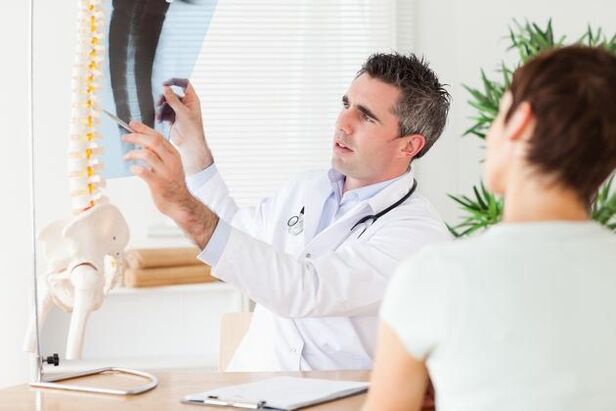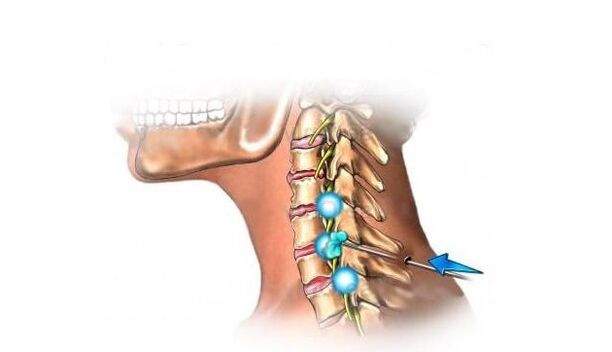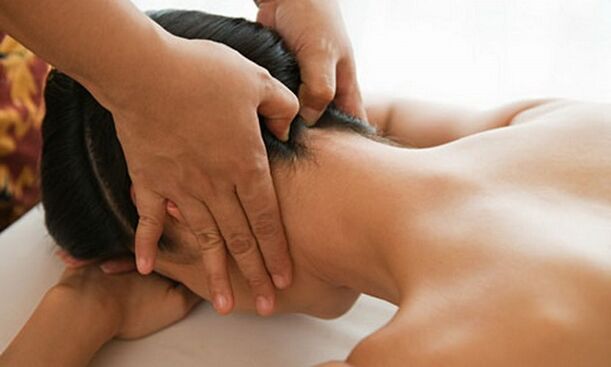Constant headaches, heaviness in the back of the head, numbness in the hands - this is most likely osteochondrosis of the cervical spine.Its symptoms can be mistaken for other diseases, such as angina or migraine.The sooner the correct picture of the disease is identified, the more successful the treatment.

Symptoms and causes
We have to admit that this is the disease of the century.Can we say that before it was not so widespread?Perhaps yes.If previously it was a disease of the elderly, now it has become much younger.After all, the root cause of painful deformation of the intervertebral cartilages in the neck and back is physical inactivity - eternal sitting near a desk or in front of a computer in a motionless position, with a bowed head.A person stays in the same position after work - in the car or at home in front of the TV.The result is degenerative changes in the intervertebral discs, disrupting the blood supply to important arteries leading to the brain.It all starts with a crunching sound in the vertebrae when turning the head, and then nagging pain appears in the back of the head, neck, shoulders and forearms, and numbness in the fingers.If an accurate diagnosis has not yet been made - osteochondrosis of the cervical spine, the symptoms may resemble an attack of angina, as the pain radiates to the arm and sternum.It’s not difficult to check this yourself: if nitroglycerin doesn’t help, then the problem is not in the heart.Although, of course, experiments with health are not welcome for any disease.

Treatment
Osteochondrosis of the cervical spine requires complete, comprehensive treatment, which should be prescribed by an osteopath.Complex - because the disease cannot be treated with medications or folk remedies alone.You need both, plus physical therapy and therapeutic massage.As for medications, experts certainly recommend a course of so-called chondroprotectors - drugs that stop the process of destruction of cartilage between the vertebrae and restore cartilage tissue.Anti-inflammatory drugs are included.If necessary, a course of painkillers and antispasmodic injections can be administered.Physiotherapeutic procedures prescribed in parallel with drug treatment also have a good effect.
Therapeutic exercise and massage
It would seem that the patient can prescribe this part of the treatment for himself.This is a huge mistake.Everything related to the disease of the cervical spine is the work of an experienced, trusted neurologist, osteopath, chiropractor, but not an amateur massage therapist.Moreover, there are deaths due to the sharp manipulations of such “farmers”.But within the framework of the article, that is, at a distance, only general recommendations can be given.So, if a patient suspects that he has osteochondrosis of the cervical spine, symptoms and pain in the back of the neck, headaches, numbness of the fingers, the condition can be alleviated with simple exercises.
- Sitting on a chair, with soft, smooth movements, perform circular movements with your head, 15 times in each direction.No sudden movements, especially backwards!
- Tilt your head back and forth, also smoothly and carefully.
- "Mill" - an exercise for the hands.Rotate your arms back and forth 50 times (you can increase them), even through pain.
- Wrap your hands around your head - thumbs under the chin, the rest of your fingers on the back of your neck and on the back of your head - and try to stretch the neck muscles and vertebrae.It will immediately become easier.
If you do these simple exercises every day, the pain will decrease significantly.As for massage, this has already been said: massage of the cervical-collar area should only be performed by a specialist.

Traditional methods of treatment
Unfortunately, it cannot be said that folk remedies can definitively cure cervical osteochondrosis.Symptoms, of course, can be relieved, but by and large you cannot do without the involvement of specialists.How can you relieve pain in the neck, head, and arms due to osteochondrosis?Compresses made from medicinal herbs help a lot.So, a juicy leaf of burdock or horseradish can be doused with boiling water and applied to the sore scruff of the neck, covered with foil on top and wrapped with a scarf.The compress can be kept for at least a whole day.The same cannot be said about a compress with mustard: dilute 50 g of dry powder and aloe juice with alcohol, add a little propolis.In fact, it is recommended to apply this mixture at night, and it is actually effective, but you should not let it burn.Last but not least is proper nutrition.Everyone knows that the first enemy in osteochondrosis is salt, which means you need to sharply limit its use.Foods rich in uric acid are not recommended - rich meat soups and broths, smoked meats, sorrel, spinach.And the main advice is not to let the disease get worse, start treatment at its first signs.



















